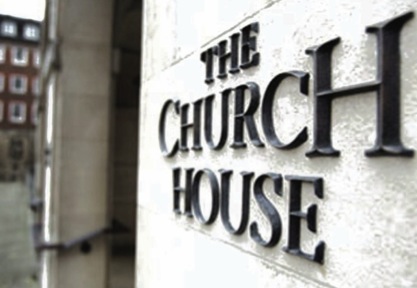 |
Postcard from London
By John Martin
While the so-called silly season is behind us, one topic (sex) continues to claim religion headlines in the U.K. The latest development was the announcement Sept. 15 that a team of 10 bishops will shape a response of the College of Bishops following an almost two-year process of shared conversations about same-sex relations.
The group, to be chaired by the Rt. Rev. Graham James, Bishop of Norwich, includes three women: the Rt. Rev. Libby Lane, Bishop Stockport; the Rt. Rev. Sarah Mullally, Bishop of Crediton; and the Rt. Rev. Jo Wells, Bishop of Dorking, who took up her role only last week.
Observers believe the group is weighted in a conservative direction. It includes a traditionalist, the Rt. Rev. Jonathan Goodall, Bishop of Ebbsfleet, and a conservative evangelical, the Rt. Rev. Rod Thomas, Bishop of Maidstone.
Gay activists sharply criticised its composition. Jayne Ozanne, a General Synod member, expressed dismay and told The Telegraph: “Yet again the Church of England is talking about us without us.”
Others were more sanguine. Canon Rosie Harper, who takes a liberal stance, believes change will come. “It is quite conservative but these are the people that they’ve got to get on board,” she told The Telegraph. “You can’t not have Rod Thomas.”
Over the border in Wales, at the meeting of the Governing Body at his final presidential address Sept. 14, the Most Rev. Barry Morgan focused on sexuality. Morgan said it was not possible to argue that there is one settled understanding of what the Bible says on sexuality, that Church attitudes on slavery had changed, and that the same could happen on sexuality.
This drew a sharp response from the Rev Ian Paul, a member of the Archbishops Council of the Church of England: “Very many scholars of the Bible, including those who do not agree with the Church’s traditional teaching on sexuality, would be astonished by his statement that ‘the Bible has more than one view on homosexuality.’ The few texts that are directly relevant are uniformly negative.”
During the weekend of Sept. 2-4, The Guardian grabbed headlines when the Rt. Rev. Nicholas Chamberlain, Bishop of Grantham, was the first Church of England bishop to “publicly declare that he is gay and in a relationship.” In the U.K. it is illegal for the media to “out” an individual. In this instance Chamberlain effectively outed himself by confirming the story when a Sunday newspaper threatened to expose him.
How did this story emerge? My reading is that it connects to an earlier Guardian story about the expected letter by gay clergy declaring they were in gay marriages and urging the Church to change its teaching (TLC, Aug. 12).
The advance spin heralded something groundbreaking. It was hardly that. Just eight clergy and their spouses signed the letter. Six others indicated support but declined to be named. Four had already acknowledged their relationships. One has not held a license for a decade; one is retired; one is in academia; and one is an incumbent about to retire.
Ahead of sending the letter, as its authors tried to build up the story in conversations with journalists, the situation of the Bishop of Grantham arose. Framers of the letter hoped that Chamberlain would join their campaign. It did not turn out that way.
Chamberlain told The Guardian he did not want to become known as “the gay bishop” but that he hoped to be “a standard-bearer for all people as a gay man. And I really hope that I’ll be able to help us move on beyond matters of sexuality.”
For some time now the Church of England has agreed that same-sex attraction is not a barrier to being ordained to the priesthood or episcopate. A 2007 General Synod motion stated that “Homosexual orientation in itself is no bar to a faithful Christian life or to full participation in lay and ordained ministry in the Church.”
Arguably this was a non-story. Chamberlain lives alone. He has a male partner but maintains the relationship is celibate. Chamberlain told The Guardian he adhered to church guidelines, under which gay clergy must be celibate and are not permitted to marry.
“We explored what it would mean for me as a bishop to be living within those guidelines,” he said of discussions leading to his appointment. “People know I’m gay, but it’s not the first thing I’d say to anyone. Sexuality is part of who I am, but it’s my ministry that I want to focus on.”
Archbishop Welby said: “His appointment as bishop of Grantham was made on the basis of his skills and calling to serve the Church in the Diocese of Lincoln. He lives within the bishops’ guidelines and his sexuality is completely irrelevant to his office.”









